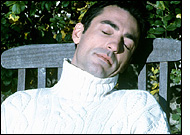The Multiple Sleep Latency Test or MSLT is an evaluation for excessive somnolence
or sleepiness. Patients are first seen in our Sleep Disorders Clinic, by one
of our physicians who are fellows of the American Sleep Disorders Association.
Patients are then typically seen for an overnight sleep study followed by the
MSLT.
For the MSLT, a series of short naps beginning the morning after the overnight
study, are recorded. The sleep specialists look for the amount and type of
sleep recorded during the naps to help understand sleep patterns and to initiate
treatment. The sleep technicians apply a number of electrodes on the head and
skin to record various activities (brain wave, muscle movements, eye movements,
breathing through the mouth and nose, snoring, heart rate and leg movements).
Flexible elastic belts will be placed around the chest and abdomen to measure
breathing. A pulse oximeter is typically clipped to the index finger as well.
Once the study is completed, a follow-up appointment is scheduled in the clinic
to discuss and review the study and all appropriate recommendations. Throughout
the process, the referring physician is sent all reports with recommendations.
The most common patients that experience MSLT are pediatric (three years of
age through age 15) through the geriatric population.
 On the day of the study, caffeine (coffee, tea, cola and chocolate) should
be avoided after 2:00 pm. All medications should be taken as usual. Before
coming in for the study, hair should be washed and dried and no hair products
(hair spray, gels or oils) should be used. Assuming the MSLT follows an overnight
study, it is suggested that the patient pack an overnight bag for his/her comfort.
In addition, patients are permitted to bring their own pillow if they feel
they will sleep better.
On the day of the study, caffeine (coffee, tea, cola and chocolate) should
be avoided after 2:00 pm. All medications should be taken as usual. Before
coming in for the study, hair should be washed and dried and no hair products
(hair spray, gels or oils) should be used. Assuming the MSLT follows an overnight
study, it is suggested that the patient pack an overnight bag for his/her comfort.
In addition, patients are permitted to bring their own pillow if they feel
they will sleep better.
All patients are asked to arrive 30 minutes prior to their appointment time.
They are to report to Outpatient Registration and will be given directions
to the department once registration is completed.

